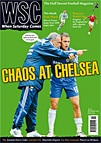 Paul Joyce reports on Austrian clubs selling their indentities
Paul Joyce reports on Austrian clubs selling their indentities
If your average attendance is only 800, it might seem unwise to hint to supporters that there are better ways of spending their free time. Yet this is what happened in March, when Austrian second-division side SC Schwanenstadt changed their name to SCS bet-at-home.com. It could have been worse. “It was important for us to maintain the club’s identity,” enthused Klaus Gruber, marketing manager of the online betting company behind the rebranding. “That’s why we kept their initials at the front.”
This latest incident of identity theft caused little more than a resigned shrug in Austria. As teams in the T-Mobile Bundesliga earn a mere 20th of the TV revenue available to their German neighbours, 50 to 70 per cent of a top-flight side’s annual budget is provided by commercial sponsors, whose demands for publicity invariably result in the defacement of traditional club names. Some of these corporate makeovers have a poetry all their own. Moustache ATUS Nötsch sounds like a violent sneeze induced by a surfeit of facial hair. And you worry whether SV Glatter Edelpute (Glatter’s Quality Turkeys) will struggle to raise a team after Christmas. Full marks, too, to Viennese minnows FC Invest Concept Schnitzlplatz’l for selling out to both an investment firm and a takeaway schnitzel emporium.
As the case of Red Bull Salzburg has shown, the clear beneficiaries of this Faustian pact are the sponsors, not the clubs. Richard Trenkwalder, president and major sponsor of second-division Trenkwalder SK Schwadorf, calculated in June that his club, whose playing budget this season is only €3 million (£2m), would net him an advertising revenue of €4m. Trenkwalder, whose personnel company has an annual turnover of €600m, plans to establish Schwadorf in the UEFA Cup, despite the village having only 2,000 inhabitants.
Yet the poor standard of Austrian football means that sponsors seeking European publicity are likely to be disappointed. Despite a budget of €60m, Red Bull Salzburg have failed twice to qualify for the Champions League – and UEFA refers to the club only as “SV Salzburg”. Predictably, owner Dietrich Mateschitz has now turned his attention instead to Germany. His bid to buy fourth‑division Sachsen Leipzig in November 2006 failed when the German authorities refused to let him rebrand the club Red Bull Leipzig. Mateschitz then announced in May that he had a “strategic escape plan” of playing his Red Bull first team in the German Bundesliga, leaving a reserve team in Salzburg to win the Austrian league.
And it is the clubs that suffer when sponsors grow tired of their executive toy. SC Untersiebenbrunn, who like Schwanenstadt adopted the URL of an online betting firm, first became SC InterWetten.com, then SCU Seidl Software, and finally lost their second-division licence in 2005 after their backers pulled out.
A worse fate befell SV Pasching. Having been rechristened “FC Superfund”, the tiny Linz‑based club reached the UEFA Cup three times in a row from 2004 onwards. Yet in May 2007, president Franz Grad announced that “running a Bundesliga club in Pasching is like building a hotel in the desert” and handed Superfund’s squad and top-flight licence to the city of Klagenfurt in Carinthia, which had a brand new stadium for Euro 2008 but no Bundesliga side to play in it.
The 2006-07 Bundesliga campaign was also scarred by the insolvencies of both Sturm Graz and Grazer AK, who had overstretched themselves trying to secure Champions League qualification. Grazer AK, who beat Liverpool 1-0 at Anfield in August 2004, were demoted to the third division after running up debts of €15m. In fact the parlous financial state of Austrian club football owes as much to the unchecked profligacy of its autocratic chairmen as it does to the interference of outside sponsors.
Nor are the clubs who resist the corporate vandalism of their names necessarily better off. Rapid Vienna president Rudolf Edlinger stated in June that selling out to a powerful sponsor would be “a betrayal of the club’s great history”. Yet at the same time Edlinger, a former Social Democrat finance minister, had to explain why Rapid had accepted €1m per year since 2004 from the manufacturer of the Eurofighter aircraft purchased by the Austrian state.
After enduring a stream of humiliating sponsorships, from hair-restoring cream (FC Capillaris Tirol) to dairies (FC Tirol Milch), Wacker Innsbruck fans persuaded the club in October 2006 to restore the sponsor-free name under which they were founded in 1915. A survey of 20,000 supporters had revealed what any first-year marketing student could tell you – brand loyalty can only be established if you don’t keep changing the name of the brand. Yet with Wacker an estimated €16m in debt – a legacy of their 2002 insolvency after winning three successive Austrian championships – you wonder how long they can hold out against the lure of the Superfunds.
From WSC 249 November 2007